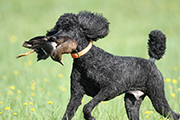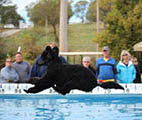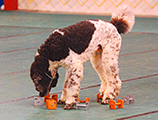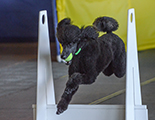Home Treatment for Sebaceous Adenitis
(Once a biopsy report has established the diagnosis)
Disclaimer: This informational material assumes that you are working with a qualified veterinary dermatologist in diagnosing and treating your dog’s skin/coat problems.
(See Understanding SA Fact Sheet at http://vipoodle.org/fact_sheet/sebaceous-adenitis/)
Sebaceous adenitis (SA) is a hereditary skin disease in which the sebaceous glands become inflamed, often leading to progressive loss of hair. The care of skin and coat on an SA affected dog can be time consuming and requires a dedicated owner. Keeping the coat very short can aid in the maintenance. The disease can vary from barely noticeable to severe scales, hair loss, and open sores. Care of each dog must be individualized and the more severely affected dogs should be managed in concert with the recommendations of your veterinary dermatologist.
Principles:
- The excessive scales need to be softened by using a soak in a mild oil.
- The scales need to be removed by a series of shampoos and GENTLE scrubbing to remove the scale from the skin as well as from the hair shafts.
- The skin should be kept lubricated with a dilute oil or heavy coat conditioner.
- Repeat oil soak and shampoos are done on a regular basis to maintain a clean skin and coat. The frequency depends upon the severity of the disease.
- Most people find that, after a few frequent treatments, the treatments can be decreased to as little as twice a month.
The type of oil used is up to the user but something that is soluble in water is ideal. For example, the #1 All Systems coat oil, Alpha-Keri, and generic bath or shower oils have each been used. The shampoo can be a mild detergent such as Dawn dish detergent or any of the canine shampoos. Do not use human shampoos as the pH of a dog’s skin is quite different and you can increase the damage to the skin if a harsh shampoo is used. Some recommend the use of Murphy’s Liquid Soap, which is manufactured for wood floors. It is made from vegetable oils and rinses out easily, especially when diluted slightly. Use it as a shampoo, rubbing it in well for 10 minutes before rinsing out completely. It leaves a strong odor on the dog which some dogs and owners do not like. Another effective treatment consists of a goats’ milk soap, apple cider vinegar rinse and coconut oil conditioner infused with essential oils.
Method:
- Coat the dog in a dilute oil solution (for example ½ cup of oil in a quart of warm water). More severely affected dogs benefit from more oil in the mixture and mildly affected dogs require less oil.
- Let the dog soak in the oil-water mixture for 15 minutes to 1 hour, depending upon the severity of the scaling. You may need to soak even longer if there is very severe scaling.
- Lather the coat in your detergent or shampoo of choice.
- Gently scrub the lathered dog with a terry cloth or soft brush, spending extra time on the areas with the most severe scaling.
- Rinse and repeat #3, 4 and 5 several times.
- Rinse thoroughly.
- Apply a heavy conditioner or light oil.
- Let the dog air dry, or gently blow dry if the dog has sufficient coat and the skin is not bare and painful.
Most people find that, once the coat has been treated for a few weeks, the coat begins to grow again. Often the hair is softer and less curly when it grows back out, but the dog has adequate coat to begin growing out into a desired pet pattern, the skin heals nicely and the dog once again looks like a poodle and feels comfortable. Continued long-term maintenance of coat and skin care is required.
The information contained in these documents is current at the time of this writing and is accurate to the best of VIP’s knowledge.
This information has been provided to you at no charge. You are free to use it provided it is used in its entirety with no changes or alterations and that the copyright remains intact. If you have found this information to be helpful, please consider making a tax-deductible donation to:
Versatility in Poodles
4061 Highlands Rd
Franklin, NC 28734
To make a donation via PayPal, please click the Donate Button:
The contents of the www.vipoodle.org website, such as text, graphics, images, and other material contained on this site (“Content”) are for informational purposes only. The Content is not intended to be a substitute for professional veterinarian advice, diagnosis, or treatment. Always seek the advice of your veterinarian with any questions you may have regarding the medical condition of your pet. Never disregard professional advice or delay in seeking it because of something you have read on this website!
If you think your pet has a medical emergency, call or visit your veterinarian or your local veterinary emergency hospital immediately. Versatility in Poodles and www.vipoodle.org do not recommend or endorse any specific veterinarians, products, procedures, opinions, or other information that may be mentioned on this website. Reliance on any information appearing on this website is entirely at your own risk.















